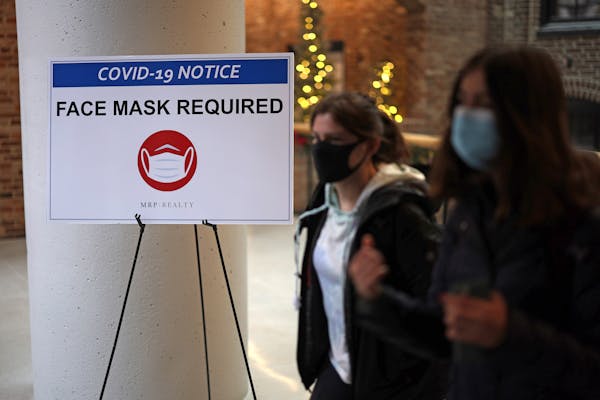Golden Valley and Hopkins are the first metro area suburbs to mandate mask wearing in public indoor settings, a move that many Minnesota cities — outside Minneapolis and St. Paul — have resisted because of the difficulty of enforcement.
City councils in both cities Tuesday declared a local public health emergency related to the COVID-19 pandemic and the delta and omicron variants, granting their mayors the authority to immediately establish mask mandates.
The Golden Valley mandate will take effect at 5 p.m. Thursday and continue until the council ends it. Hopkins' mandate takes effect at midnight Friday and will end Feb. 13.
"We're asking people to please cooperate," said Golden Valley Mayor Shep Harris. "It is vital for everyone's health. … It may not be perfect, but it is for the best of all of us to go forward in this direction."
"We prefer ... more cities doing this in terms of public health impact," Hopkins Mayor Patrick Hanlon said Wednesday. "We really feel like the strong statement a city can make is creating the mandate, and the feedback we were getting seemed to be the will of our community in taking this step."
Most cities so far have decided against mandates. The Duluth City Council failed to pass a mask mandate Monday night and the St. Cloud council rejected a plea for a six-week mandate from the area's largest health care system.
Suburbs such as Bloomington and Edina have passed resolutions strongly encouraging residents to mask up without requiring it. The Minnetonka City Council is set to consider a mask mandate Friday.
Golden Valley council members unanimously approved the mandate after two maskless residents spoke out against it in the council chambers. Several residents called in to express support, including Council Member Gillian Rosenquist, who said she was in quarantine after her three children tested positive.
The Hopkins City Council approved the measure on a 4-1 vote, following a 90-minute discussion with business owners and residents speaking for and against the measure. Council Member Alan Beck cast the dissenting vote.
The mandates apply to everyone, regardless of vaccination status, at indoor public settings like restaurants, bars, theaters and fitness centers. Face masks are not required for athletes or performers participating in an event, or when people are eating or drinking.
Golden Valley is requiring face coverings for anyone over the age of 2, while Hopkins' mandate applies to anyone over the age of 5.
People violating the mandates may be given a written warning, asked to leave the premises or charged with a misdemeanor, and businesses in violation may be cited.
Bloomington City Council Member Nathan Coulter said that he supported a mandate but believed it should be issued statewide by Gov. Tim Walz rather than left to local governments. "Nobody who isn't already wearing a mask is going to do so because the city of Bloomington says so," he said.
Council Member Shawn Nelson asked if Bloomington could incentivize businesses — such as waiving liquor license fees — to require customers to wear masks or provide proof of vaccination or a negative COVID test. Staffers were researching incentives for the council to consider.
Golden Valley Council Member Denise La Mere-Anderson said she struggled with passing a mandate because, she said, some people just won't change their behavior. "There is nothing we can do to get them to wear a mask," she said.
Beck, the only Hopkins council member to reject the mandate, said in an e-mail that individuals have already decided whether they will wear a mask. "A patchwork of local ordinances attempting to control a global pandemic does not have a high probability of success," he said.
When Minneapolis and St. Paul officials reinstated mask mandates last week, they recommended that people wear N95 or KN95 respirator masks, which offer more protection than cloth masks against infection. Short of that, they said, people should wear a tight-fitting cloth mask with two layers, or a disposable mask under a cloth mask.
Enforcement is a major factor for officials in deciding against a mandate, especially in cities without their own police. Even in Golden Valley, which has a police department, Chief Scott Nadeau told the council that resources to enforce the mandate are limited. If police respond, he said, it could lead to confrontations.
Nadeau said he was surprised last weekend in St. Paul, which has a citywide mandate, when he saw a number of unmasked people at a grocery store.
Amber Eisenschenk, research manager with the League of Minnesota Cities, said that the reluctance of city leaders to approve mask mandates "speaks to the political polarization that COVID has had the past two years."
"I don't remember an issue that was as polarizing from a city perspective," she said. "You have to have the buy-in of the community. ... Mandates are notoriously hard to follow."

Want to share info with the Star Tribune? How to do it securely

'Safe recovery sites' would offer syringes, naloxone and more to people using drugs. The plan could be in peril.
New Minnesota GOP leaders seek peace with party's anti-establishment wing

Who is Republican Lisa Demuth, Minnesota's first House speaker of color?

